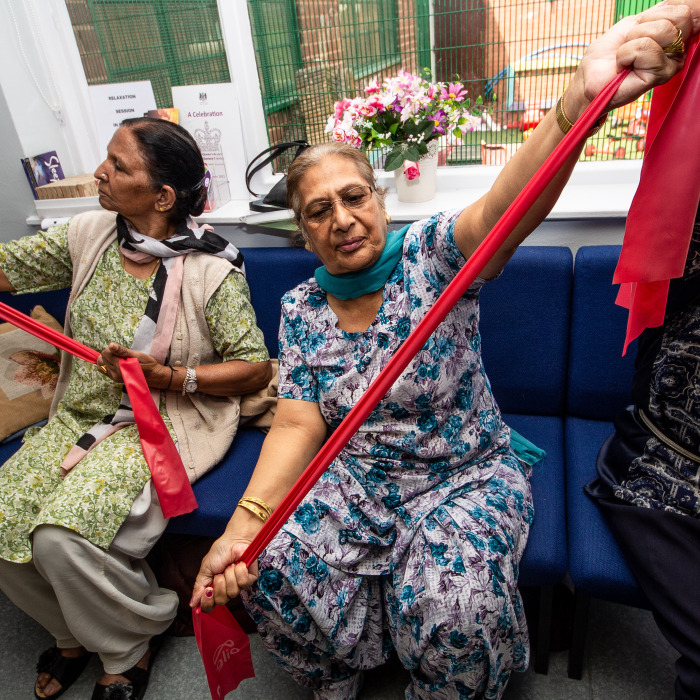A Sport England guest blog on Closing the Gap with Get Out Get Active
In August 2022, Sport England invited Get Out Get Active to present during some #ClosingTheGap2022 webinars.

Get Out Get Active; intersectional approaches to closing the participation gap in Sport & Physical Activity
Earlier this summer, we came together with Greater Manchester Moving, GreaterSport and a range of community leaders and change-makers for a series of action-focused events. Dedicated to tackling the deeply ingrained racial inequalities that exist throughout the sport and physical activity sector, these conversations cemented Sport England’s role as a convenor in Uniting the Movement and highlighted the importance of creating spaces for historically excluded voices to be heard, and more importantly, for those communities to lead the way.
We’ve committed to holding that space moving forwards and since our face-to-face events, the #ClosingTheGap2022 programme has hosted a series of webinars exploring a range of equality issues. This month, over 150 people joined us for two sessions (expertly chaired by Esther Jones from Sport England’s disability team) exploring the Get Out Get Active (GOGA) programme.
I asked Esther why the work of the GOGA programme is so important.
“The programme looks to support the most inactive people to experience the benefits of physical activity. It works with a diverse range of people across a whole host of communities and brings people together. The GOGA approach encourages disabled people and non-disabled people to get active together, by engaging people through their existing trusted networks. A substantial proportion of disabled people want to be active with non-disabled people, and be part of in their locally community. GOGA is a notable example of how to put people at the heart of the programme. Each locality works to co-create the offer with the community to ensure it meets their needs. It also supports participants to have the confidence to engage in activity beyond the GOGA.”
A national perspective; what is GOGA?
On August 2nd, we were joined by Helen Derby (GOGA England Programme Manager) and Helen Newberry (GOGA Workforce Lead) who described how the GOGA programme has helped over 30,000 disabled and non-disabled people enjoy the benefits of being active together since 2016. Taking place in 21 locations across the UK, GOGA is partnered with Activity Alliance and a range of other local and national organisations, to help bring communities together to experience the joy of accessible and inclusive activities.
GOGA colleagues shared a range of learnings from the national programme, as well several resources that can support organisations to embed the GOGA approach themselves:
GOGA local; working alongside faith-based communities in the Black Country
The following week (August 9th) Bethune Smith (Faith and Activity Co-ordinator) and Mike Salmon (Head of Insight, Health & Wellbeing) from Active Black Country joined us online to talk about what the GOGA programme has achieved in a culturally diverse region of the West Midlands where activity levels are stubbornly low.
Despite the added challenges of launching the GOGA programme during the early stages of the COVID-19 pandemic in 2020, Active Black Country supported communities to thrive amid a wave of national and local lockdowns. By tapping into a network of black-led churches, the GOGA team were able to provide local households with packs that supported a range of different ways to be active. They included frisbees, balls and cones, basic gardening tools and seeds, as well as water bottles, face masks and instructions for a range of exercises.
Impact
Over the course of the pandemic, Active Black Country refined and expanded the GOGA programme by developing a training programme for faith leaders that could support them to encourage activity in their communities. The team also created a series of guides to local parks, canals and green spaces to help the communities’ confidence in getting out and getting active. After mapping the local areas, these resources included information about local travel, accessibility, the location of ‘green gyms’ and even the gradient of any paths.
The results? Over 170 people have benefitted from the GOGA programme in the Black Country:
- 46% of participants had a long-term health condition and/or impaired mobility.
- 74% of participants were from culturally diverse backgrounds.
- 30% of those engaging with GOGA for the first time reported no activity in the preceding week.
Once COVID restrictions eased, Active Black Country’s GOGA programme went from strength to strength, supporting a range of culturally competent activities across the Black Country, from yoga being taught in gurdwaras to chair-based exercise classes in black-led churches. The learning from which has resulted in a toolkit for faith centres, designed to support them in helping their communities to be more active.
We asked Mike to describe the wider impact of adopting the GOGA approach at Active Black Country?
“The GOGA project, and associated learnings, have contributed directly to the design and development of our Commonwealth Active Communities programme. This is a £1.8m legacy programme, funded by Sport England and National Lottery and our application centred heavily on the model we utilised in GOGA, placing emphasis on the importance of skilled capacity that is able to develop trust and connect between different community based organisations to enable grassroots delivery whilst being mindful of local strategic implications and overarching goals. The learnings from GOGA enabled us to make the case for 8 Connectors across the Black Country, providing us with an excellent opportunity to continue to close the gap with the rest of the country in relation to inactivity."
For more information on Sport England please visit the Sport England website.